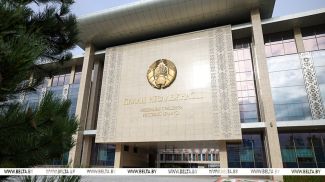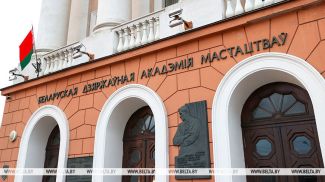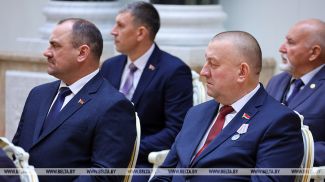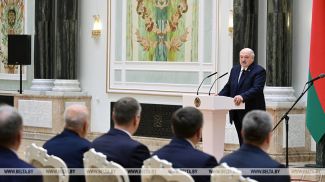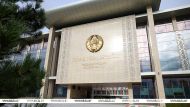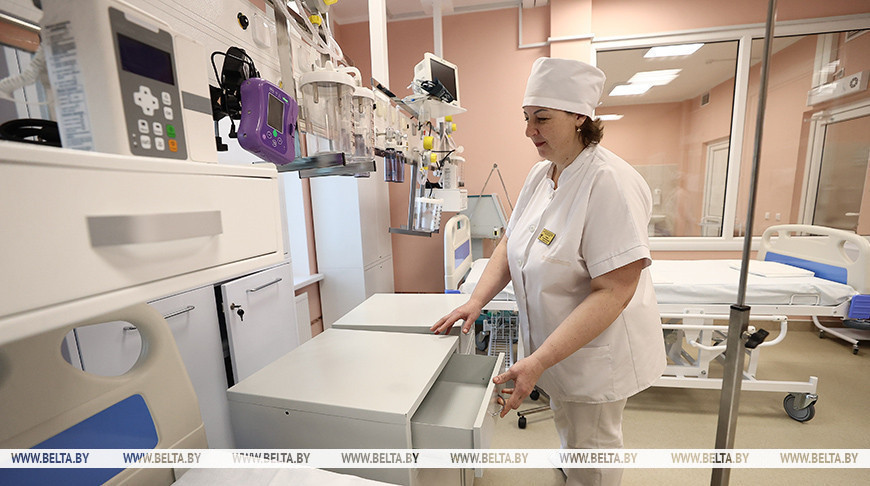
An archive photo
GRODNO, 2 April (BelTA) – Healthcare services should be accessible and affordable for everyone in Belarus, Belarusian President Aleksandr Lukashenko said as he was hearing a report by Healthcare Minister Aleksandr Khodzhayev in Grodno, BelTA has learned.
“We need to make sure that our healthcare is people’s healthcare, as we used to say. It should be accessible and affordable to everyone equally,” the president said setting the task for the minister.
“We need to make sure that our healthcare is people’s healthcare, as we used to say. It should be accessible and affordable to everyone equally,” the president said setting the task for the minister.
The head of state asked the minister whether he already got his feet under the table in his new job, whether he faced any problems, and how personnel issues were being addressed.
Aleksandr Khodzhayev responded that the instructions of the head of state are being fulfilled, including on prices and personnel.
“Is Vladimir Stepanovich [Grodno Oblast Governor and former Healthcare Minister Vladimir Karanik] involved or is he an onlooker?” asked Aleksandr Lukashenko.
“He helps, we regularly get in touch to deal with the issues that arise. We have built such working relationship that I feel free to approach him for advice,” assured Aleksandr Khodzhayev.
The head of state asked whether the Healthcare Ministry is well-staffed and whether personnel issues need to be resolved.
The minister noted that candidates for vacant positions will soon be named.
“If you don’t go with the flow, but, like Karanik, stick to your course, the situation in the healthcare will be all right. I have said before that there are plenty of clans in the healthcare sector, they like to “swim” the way they please, to serve people in higher positions. It is necessary to bring things to rights,” the head of state demanded.
Aleksandr Lukashenko also touched upon personnel issues in the healthcare sector as a whole: “They say there is not enough of this, not enough of that. Doctors, nurses... Listen, we have no shortages. Yet, in our country some people, including doctors, want to work the way they do in our country, but to live like in the West and get big money. They [in the West] work around the clock, especially young people. I know this for sure. They work day and night. And they earn accordingly.”
At the same time, the head of state noted that doctors working at Belarus’ best clinics earn very decent money.
Moreover, the government has previously provided significant financial support to doctors. “What I had promised. They were paid extra during the pandemic. I told them that I would not cancel these bonuses. And I did not. The doctors wouldn’t believe that they would keep their bonuses. But we delivered on our promise. Yet, they also need to put in more effort. A wonderful profession, a wonderful job. Probably, better than any other career in the world. Of course, it comes with responsibility and requires hard work. Recalibrate your work and do your job properly,” said Aleksandr Lukashenko.
Vladimir Karanik remarked that the financial support requested by the president for doctors was even bigger than what the Healthcare Ministry asked for.
“Few people remember now, but I remember well that our proposals for financial incentives during the pandemic were increased several times by your decision. We didn’t even ask for that much,” he said.
“Is Vladimir Stepanovich [Grodno Oblast Governor and former Healthcare Minister Vladimir Karanik] involved or is he an onlooker?” asked Aleksandr Lukashenko.
“He helps, we regularly get in touch to deal with the issues that arise. We have built such working relationship that I feel free to approach him for advice,” assured Aleksandr Khodzhayev.
The head of state asked whether the Healthcare Ministry is well-staffed and whether personnel issues need to be resolved.
The minister noted that candidates for vacant positions will soon be named.
“If you don’t go with the flow, but, like Karanik, stick to your course, the situation in the healthcare will be all right. I have said before that there are plenty of clans in the healthcare sector, they like to “swim” the way they please, to serve people in higher positions. It is necessary to bring things to rights,” the head of state demanded.
Aleksandr Lukashenko also touched upon personnel issues in the healthcare sector as a whole: “They say there is not enough of this, not enough of that. Doctors, nurses... Listen, we have no shortages. Yet, in our country some people, including doctors, want to work the way they do in our country, but to live like in the West and get big money. They [in the West] work around the clock, especially young people. I know this for sure. They work day and night. And they earn accordingly.”
At the same time, the head of state noted that doctors working at Belarus’ best clinics earn very decent money.
Moreover, the government has previously provided significant financial support to doctors. “What I had promised. They were paid extra during the pandemic. I told them that I would not cancel these bonuses. And I did not. The doctors wouldn’t believe that they would keep their bonuses. But we delivered on our promise. Yet, they also need to put in more effort. A wonderful profession, a wonderful job. Probably, better than any other career in the world. Of course, it comes with responsibility and requires hard work. Recalibrate your work and do your job properly,” said Aleksandr Lukashenko.
Vladimir Karanik remarked that the financial support requested by the president for doctors was even bigger than what the Healthcare Ministry asked for.
“Few people remember now, but I remember well that our proposals for financial incentives during the pandemic were increased several times by your decision. We didn’t even ask for that much,” he said.
It should also be kept in mind that in many Western countries people pay higher taxes, while education and healthcare are not free there. “Do you want this? If you do, fine. If you want it, Karanik and I will introduce a Polish, European healthcare system in Grodno Oblast by the end of the year,” the president suggested. “Then you will pay your way. And you will see how many people will become homeless, how many will die. You will be getting healthcare services as long as you will be able to pay for them; if you have no money, you will be denied treatment.”
The head of state emphasized that such principles and such policies are currently unacceptable for Belarus. “We have a welfare state,” he stated. “We are gradually moving in this direction: if you earn money, it’s good, if you don’t, why should you live at someone else’s expense? But this will not happen overnight. A century will pass before this principle is introduced.”
Wrapping up the topic of earnings, the president reiterated that it was decided to retain bonuses for healthcare workers once the pandemic was over. “But time has passed, this has been forgotten. Many would say: there are not enough doctors, nurses and the salary is somehow too low,” the president noted. In this regard, the head of state put forward a solution that will work not only for healthcare institutions, but also for other organizations on the government payroll, for example, district and city executive committees. Their salary fund will depend on staff numbers. Thus, if there are fewer people on the staff, the remaining financial resources can be redistributed among those who work, for example, double shifts.
The head of state emphasized that such principles and such policies are currently unacceptable for Belarus. “We have a welfare state,” he stated. “We are gradually moving in this direction: if you earn money, it’s good, if you don’t, why should you live at someone else’s expense? But this will not happen overnight. A century will pass before this principle is introduced.”
Wrapping up the topic of earnings, the president reiterated that it was decided to retain bonuses for healthcare workers once the pandemic was over. “But time has passed, this has been forgotten. Many would say: there are not enough doctors, nurses and the salary is somehow too low,” the president noted. In this regard, the head of state put forward a solution that will work not only for healthcare institutions, but also for other organizations on the government payroll, for example, district and city executive committees. Their salary fund will depend on staff numbers. Thus, if there are fewer people on the staff, the remaining financial resources can be redistributed among those who work, for example, double shifts.




